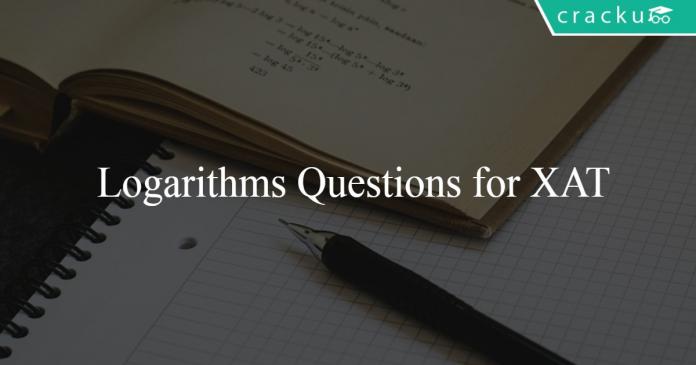Logarithms Questions for XAT (PDF)
Download important Logarithms Questions for XAT PDF based on previously asked questions in XAT exam. Practice Logarithms Questions PDF for XAT exam.
Download Logarithms Questions for XAT PDF
Get 5 XAT mocks for Rs. 299. Enroll here
Question 1: If $log_3 2, log_3 (2^x – 5), log_3 (2^x – 7/2)$ are in arithmetic progression, then the value of x is equal to
a) 5
b) 4
c) 2
d) 3
Question 2: Let $u = ({\log_2 x})^2 – 6 {\log_2 x} + 12$ where x is a real number. Then the equation $x^u = 256$, has
a) no solution for x
b) exactly one solution for x
c) exactly two distinct solutions for x
d) exactly three distinct solutions for x
Question 3: If $log_y x = (a*log_z y) = (b*log_x z) = ab$, then which of the following pairs of values for (a, b) is not possible?
a) (-2, 1/2)
b) (1,1)
c) (0.4, 2.5)
d) ($\pi$, 1/ $\pi$)
e) (2,2)
Question 4: If x >= y and y > 1, then the value of the expression $log_x (x/y) + log_y (y/x)$ can never be
a) -1
b) -0.5
c) 0
d) 1
Question 5: If $\log_{2}{\log_{7}{(x^2 – x+37)}}$ = 1, then what could be the value of ‘x’?
a) 3
b) 5
c) 4
d) None of these
Question 6: If $\log_{2}{x}.\log_{\frac{x}{64}}{2}=\log_{\frac{x}{16}}{2}$. Then x is
a) 2
b) 4
c) 16
d) 12
Question 7: What is the value of $\sqrt{\frac{a}{b}}$, If $\log_{4}\log_{4}4^{a-b}=2\log_{4}(\sqrt{a}-\sqrt{b})+1$
a) -5/3
b) 2
c) 5/3
d) 1
Question 8: Find the value of x from the following equation:
$\log_{10}{3}+\log_{10}(4x+1)=\log_{10}(x+1)+1$
a) 2/7
b) 7/2
c) 9/2
d) None of the above
Question 9: If $\log{3}, log(3^{x} – 2)$ and $log (3^{x}+ 4)$ are in arithmetic progression, then x is equal to
a) $\frac{8}{3}$
b) $\log_{3}{8}$
c) $\log_{2}{3}$
d) $8$
Question 10: If $log_{10} x – log_{10} \sqrt[3]{x} = 6log_{x}10$ then the value of x is
a) 10
b) 30
c) 100
d) 1000
XAT Decision making practice questions
Answers & Solutions:
1) Answer (D)
$2 log (2^x – 5) = log 2 + log (2^x – 7/2)$
Let $2^x = t$
=> $(t-5)^2 = 2(t-7/2)$
=> $t^2 + 25 – 10t = 2t – 7$
=> $t^2 – 12t + 32 = 0$
=> t = 8, 4
Therefore, x = 2 or 3, but $2^x$ > 5, so x = 3
2) Answer (B)
$x^u = 256$
Taking log to the base 2 on both the sides,
$u * \log_{2}{x} = \log_{2}{256}$
=>$[({\log_2 x})^2 – 6 {\log_2 x} + 12] * \log_{2}{x} = 8$
$(log_2 x)^3 – 6(log_2 x)^2 + 12log_2 x = 8$
Let $log_2 x = t$
$t^3 – 6t^2 +12t – 8 = 0$
$(t-2)^3 = 0$
Therefore, $log_2 x = 2$
=> $x = 4$ is the only solution
Hence, option B is the correct answer.
3) Answer (E)
$log_y x = ab$
$a*log_z y = ab$ => $log_z y = b$
$b*log_x z = ab$ => $log_x z = a$
$log_y x$ = $log_z y * log_x z$ => $log x/log y$ = $log y/log z * log z/log x$
=> $\frac{log x}{log y} = \frac{log y}{log x}$
=> $(log x)^2 = (log y)^2$
=> $log x = log y$ or $log x = -log y$
So, x = y or x = 1/y
So, ab = 1 or -1
Option 5) is not possible
4) Answer (D)
$log_x (x/y) + log_y (y/x)$ = $1 – log_x (y) + 1 – log_y (x)$
= $2 – (log_x y + 1/log_x y)$ <= 0 (Since $log_x y + 1/log_x y$ >= 2)
So, the value of the expression cannot be 1.
5) Answer (C)
$\log_{2}{\log_{7}{(x^2 – x+37)}}$ = 1
$\log_{7}{(x^2 – x+37)}$ = $2$
$(x^2 – x+37)$ = $7^{2}$
Given eq. can be reduced to $x^2 – x + 37 = 49$
So x can be either -3 or 4.
6) Answer (B)
$\log_{2}{x}.\log_{\frac{x}{64}}{2}=\log_{\frac{x}{16}}{2}$
i.e. $\frac{log{x}}{log{2}} * \frac{log_{2}}{log{x}-log{64}} = \frac{log{2}}{log{x}-log{16}}$
i.e. $\frac{log{x} * (log{x}-log{16})}{log{x}-log{64}}$ = $\log{2}$
let t = log x
Therefore, $\frac{t * (t-log{16})}{t-log{64}}$ = $\log{2}$
$t^2-4*log 2*t = t*log 2-6*(log 2)^2$
I.e. $t^2-5*log 2*t-6*(log 2)^2$ = 0
I.e. $t^2-3*log 2*t-2*log 2*t-6*(log 2)^2$ = 0
i.e. $t*(t-3*log 2)-2*log 2*(t-3*log 2)$ = 0
i.e $t=2*log 2$ or $t=3*log 2$
i.e $log x=log 4$ or $log x=log 8$
therefore $x=4$ or $8$
therefore our answer is option ‘B’
7) Answer (C)
$\sqrt{\frac{a}{b}}$, If $\log_{4}\log_{4}4^{a-b}=2\log_{4}(\sqrt{a}-\sqrt{b})+\log_{4}{4}$
i.e. $\log_{4}\log_{4}4^{a-b}=\log_{4}((\sqrt{a}-\sqrt{b})^2)*4$
i.e. $\log_{4}4^{a-b}=((\sqrt{a}-\sqrt{b})^2)*4$
i.e. (a-b)*$\log_{4}4=((\sqrt{a}-\sqrt{b})^2)*4$
i.e. a-b = 4a+4b-8$\sqrt{ab}$
i.e. 3a + 5b – 8$\sqrt{ab}$ = 0
i.e. $3\sqrt\frac{a}{b}^2$ – 8$\sqrt\frac{a}{b}$+5 = 0
put $\sqrt\frac{a}{b}$ = t
therefore 3$t^2$ – 8t + 5 = 0
solving we get t = 1 or t = $\frac{5}{3}$
i.e. $\sqrt\frac{a}{b}$ = 1 or $\frac{5}{3}$
but if $\sqrt\frac{a}{b}$ = 1 then a=b then $\log_{4}(\sqrt{a}-\sqrt{b})$ will become indefinite
Therefore $\sqrt\frac{a}{b}$ = $\frac{5}{3}$
Therefore our answer is option ‘C’
8) Answer (B)
$\log_{10}{3}+\log_{10}(4x+1)=\log_{10}(x+1)+1$ can be written as
$\log_{10}{3}+\log_{10}(4x+1)=\log_{10}(x+1)+\log_{10}{10}$
We know that $\log_{10}{a}+\log_{10}{b}=\log_{10}{ab}$
$\log_{10}{3*(4x+1)}=\log_{10}{(x+1)*10}$
$12x+3=10x+10$
$x=7/2$. Hence, option B is the correct answer.
9) Answer (B)
If $log{3}, log(3^{x} – 2)$ and $log (3^{x}+ 4)$ are in arithmetic progression
Then, $2*log(3^{x} – 2) = log{3}+log (3^{x}+ 4)$
Thus, $log{(3^{x} – 2)^2} = log{3(3^x+4)}$
Thus, $(3^{x} – 2)^2 = 3(3^x+4)$
=> $3^{2x} – 4*3^x +4 = 3*3^x + 12$
=> $3^{2x} – 7*3^x – 8 = 0$
=> $(3^x+1)*(3^x-8) = 0$
But $3^x+1 \neq 0$
Thus, $3^x = 8$
Hence, $x = log_{3}{8}$
Hence, option B is the correct answer.
10) Answer (D)
$\log_{10} x – \log_{10} \sqrt[3]{x} = 6\log_{x}10$
Thus, $\dfrac{\log {x}}{\log {10}}$ – $\dfrac{1}{3}*\dfrac{\log {x}}{\log {10}}$ = $6*\dfrac{\log{10}}{\log{x}}$
=> $\dfrac{2}{3}*\dfrac{\log {x}}{\log {10}}$ = $6*\dfrac{\log{10}}{\log{x}}$
Thus, => $\dfrac{1}{9}*(\log{x})^2 = (\log{10})^2=1$
Thus, $(\log{x})^2 = 9$
Thus $\log x = 3$ or $-3$
Thus, $ x = 1000$ or $\dfrac{1}{1000}$
From amongst the given options, 1000 is the correct answer.
Hence, option D is the correct answer.
We hope this Logarithms Questions PDF for XAT with Solutions will be helpful to you.





![CAT Averages Questions PDF [Important Questions] CAT AVERAGES Questions PDF](https://cracku.in/blog/wp-content/uploads/2022/07/CAT-AVERAGES-Questions-PDF-218x150.png)